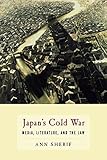Japan's Cold War : Media, Literature, and the Law / Ann Sherif.
Material type: TextPublisher: New York, NY : Columbia University Press, [2009]Copyright date: ©2009Description: 1 online resource (304 p.)Content type:
TextPublisher: New York, NY : Columbia University Press, [2009]Copyright date: ©2009Description: 1 online resource (304 p.)Content type: - 9780231146623
- 9780231518345
- DS822.5 .S426 2009
- online - DeGruyter
- Issued also in print.
| Item type | Current library | Call number | URL | Status | Notes | Barcode | |
|---|---|---|---|---|---|---|---|
 eBook
eBook
|
Biblioteca "Angelicum" Pont. Univ. S.Tommaso d'Aquino Nuvola online | online - DeGruyter (Browse shelf(Opens below)) | Online access | Not for loan (Accesso limitato) | Accesso per gli utenti autorizzati / Access for authorized users | (dgr)9780231518345 |
Browsing Biblioteca "Angelicum" Pont. Univ. S.Tommaso d'Aquino shelves, Shelving location: Nuvola online Close shelf browser (Hides shelf browser)

|

|

|

|

|

|

|
||
| online - DeGruyter Thin Places : A Pilgrimage Home / | online - DeGruyter Four Jews on Parnassus-a Conversation : Benjamin, Adorno, Scholem, Schönberg / | online - DeGruyter Wondrous Brutal Fictions : Eight Buddhist Tales from the Early Japanese Puppet Theater. | online - DeGruyter Japan's Cold War : Media, Literature, and the Law / | online - DeGruyter Pathologies of Reason : On the Legacy of Critical Theory / | online - DeGruyter Beautiful Circuits : Modernism and the Mediated Life / | online - DeGruyter Culture of the Fork : A Brief History of Everyday Food and Haute Cuisine in Europe / |
Frontmatter -- Contents -- Acknowledgments -- Chronology of the Early Cold War -- Introduction -- 1. The Meanings of War and Peace After 1945 -- 2. Sex and Democracy -- 3. Hara Tamiki -- 4. "The World Lives in Fear" -- 5. The Aesthetics of Speed and the Illogicality of Politics -- Conclusion -- Notes -- Bibliography -- Index
restricted access online access with authorization star
http://purl.org/coar/access_right/c_16ec
Critics and cultural historians take Japan's postwar insularity for granted, rarely acknowledging the role of Cold War concerns in the shaping of Japanese society and culture. Nuclear anxiety, polarized ideologies, gendered tropes of nationhood, and new myths of progress, among other developments, profoundly transformed Japanese literature, criticism, and art during this era and fueled the country's desire to recast itself as a democratic nation and culture. By rereading the pivotal events, iconic figures, and crucial texts of Japan's literary and artistic life through the lens of the Cold War, Ann Sherif places this supposedly insular nation at the center of a global battle. Each of her chapters focuses on a major moment, spectacle, or critical debate highlighting Japan's entanglement with cultural Cold War politics. Film director Kurosawa Akira, atomic bomb writer Hara Tamiki, singer and movie star Ishihara Yujiro, and even Godzilla and the Japanese translation of Lady Chatterley's Lover all reveal the trends and controversies that helped Japan carve out a postwar literary canon, a definition of obscenity, an idea of the artist's function in society, and modern modes of expression and knowledge. Sherif's comparative approach not only recontextualizes seemingly anomalous texts and ideas, but binds culture firmly to the domestic and international events that defined the decades following World War II. By integrating the art and criticism of Japan into larger social fabrics, Japan's Cold War offers a truly unique perspective on the critical and creative acts of a country remaking itself in the aftermath of war.
Issued also in print.
Mode of access: Internet via World Wide Web.
In English.
Description based on online resource; title from PDF title page (publisher's Web site, viewed 02. Mrz 2022)


